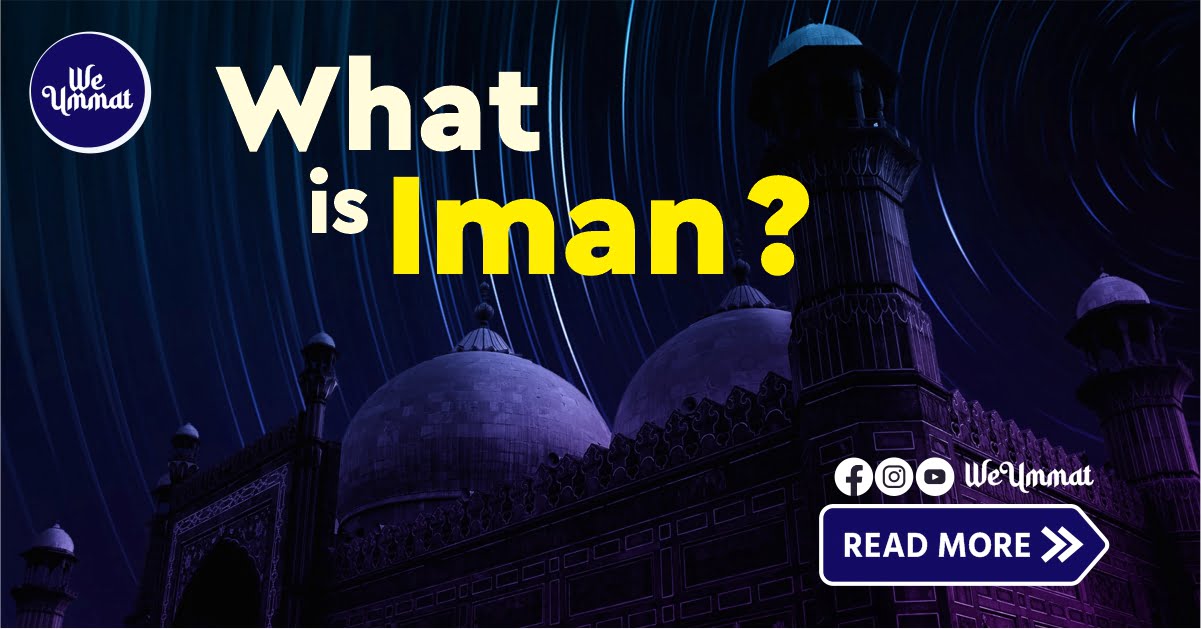Introduction
What is Iman – Asslamu alaiqum Faith ( Iman) literally means ‘ to affirm, and to give safety; a religionist adopts sound doctrine and saves himself from eternal discipline, this is why espousing sound doctrine is known as faith, Faith for a Muslim means accepting, with conviction, the foundational precepts of Islam similar as the oneness of Allah Almighty, our Messenger being the last prophet, the prophethood of former prophets Salah, fasting, Hajj, Paradise, Hell, and rejuvenation and reckoning on the Day of Judgement, etc.
Indeed the fewest skepticism about a foundational precept, let alone maximum denial of it, is unbelief and prompts the mathematization of the person.

Understanding the Concept of Iman (Faith) in Islam
It’s belief in the Unity of Allah or Tawheed. This is expressed in the primary Kalimah( Word) of Islam as “ Laa ilaaha illallaah”, meaning “ There’s no good deification but Allah. ” It’s the expression of this belief, which differentiates a true Muslim from a disbeliever, or one who associates others with Allah in His Divinity.
The acceptance or denial of this expression produces a world of difference among mortal beings. The religionist finds out the right path, knows the verity and chalks out the course of life in the light of reality; the disbeliever chases one vision after the other and gropes into the dark. For the religionists, there’s the pledge of abandoned progress and resounding success in this world and in the Hereafter; whereas failure and discredit are eventually the lot of those who refuse to believe in it.
“(O’ Muhammad SAW) Do not let those people grieve you who race each other into disbelief (Kufr) (if it be) among those who say “We believe” with their mouths but whose hearts have no true faith (Iman).”
Surah Al _Maidah (5:41)
Definition of Iman
In fact, Tawheed is a revolutionary conception, an extensively forceful doctrine and is the veritably starting- point of Islam. Still, the difference between religionists and questionnaires isn’t the result of simply uttering many words. The real force lies in the conscious acceptance of this doctrine and its reservations and complete adherence to it in practical life.
good deification but Allah Indeed in the present age, every nation on the face of the earth– from the most primitive to the most cultivated– believes in and worships some deity. It shows that the idea of having a deity and of idolization is ingrained in mortal nature.
There’s a commodity within man’s soul, which forces him to do so. Acceptance of the doctrine of Unity of Allah is what’s nominated faith in Islam. still, faith in the Islamic sense isn’t simply intellectual assent to a certain dogma or a private emotional response to a great personality, but a voluntary and dynamic response to belief in one Allah, Who stands for the loftiest perfection and belief in the Hereafter– a belief that completely assimilates both intellectual and emotional responses. It’s at formerly a protestation of a verity and a rendition to the verity affirmed.
Narrated Abu Huraira, The Prophet (SAW)said,
" Faith( Belief) consists of further than sixty branches( i.e. corridor). And Haya( This term" Haya" covers a large number of generalities which are to be taken together; amongst them are tone respect, modesty, bashfulness, and scruple,etc.) is a part of faith." Reference (Sahih Muslim 35a)
Importance Of Iman ( Faith )
Faith is important in many religions, including Islam, as it provides a foundation for belief and a source of meaning and purpose in life. In Islam, Faith (iman) is considered essential for salvation and the attainment of paradise in the afterlife.
Faith also provides guidance for daily life, helping Muslims to make ethical and moral decisions based on the teachings of the Quran and the Prophet Muhammad. Faith can also provide comfort and strength during times of difficulty or adversity, as it allows believers to trust in the wisdom and mercy of Allah. Overall, faith is a cornerstone of Islamic belief and practice, shaping the worldview and actions of Muslims around the world.
The concept of faith in Islam, according to the Quran, is based on the belief in the Oneness of Allah (Tawhid) and the acceptance of Prophet Muhammad as the last and final Messenger of Allah. Faith also involves a commitment to obey Allah’s commands and to follow the teachings of the Quran and the Prophet.
The Quran emphasizes that faith is not just a matter of words, but it is also reflected in one’s actions and behavior. A person’s faith is tested in this life, and it is through patience, perseverance, and good deeds that one can strengthen and increase their faith. The Quran also teaches that faith is a gift from Allah and that it is through His grace and guidance that one can attain true faith.
Narrated Anas, The Prophet (SAW)said,
" Whoever possesses the following three rates will have the agreeableness( delight) of faith 1. The one to whom Allah and His Apostle becomes dearer than anything differently. 2. Who loves a person and he loves him only for Allah's sake. 3. Who hates to revert to Veneration( unbelief) as he hates to be thrown into the fire." Reference(sahih Bukhari:16)
The Six Pillars of Iman as the Foundation of Islamic Belief
The six beliefs of faith in Islam are the fundamental beliefs that serve as the foundation of Muslim belief and practice. They are as follows:
1. Belief in Allah
Muslims believe in the Oneness of Allah, that there is no deity but Allah.
2. Belief in angels
Muslims believe in the existence of angels, who are created by Allah to carry out His commands.
3. Belief in the revealed books
Muslims believe in the divine books that were revealed by Allah to His prophets, including the Quran, the Torah, the Gospel, the Psalms, and others.
4. Belief in the prophets
Muslims believe in the prophets, including Adam, Noah, Ibrahim, Musa, Ismail, and Muhammad, as messengers of Allah who received divine revelations and teachings.
5. Belief in the Day of Judgment
Muslims believe in the Day of Judgment, when all humans will be resurrected and held accountable for their deeds in this life.
6. Belief in predestination
Muslims believe in the concept of qadar, which refers to the belief that Allah has knowledge of and control over all things, including human destiny.
Narrated Anas, The Prophet (SAW)said,
" None of you'll have faith till he wishes for his( Muslim) family what he likes for himself." Reference(Sahih Bukhari:13)
Benefits of Iman In Islam
Faith (iman) is considered a central aspect of Islamic belief and practice, and it offers several benefits to individuals and society as a whole. Some of the benefits of faith in Islam include:
Spiritual fulfillment
Faith provides a sense of purpose and meaning in life, and it allows individuals to connect with their spiritual nature and to develop a close relationship with Allah.
Moral guidance
Faith offers moral and ethical guidance, helping individuals to distinguish right from wrong, and to make ethical and moral decisions based on the teachings of the Quran and the Prophet Muhammad.
Comfort during adversity
Faith provides comfort and strength during times of difficulty or adversity, as it allows believers to trust in the wisdom and mercy of Allah.
Social cohesion
Faith promotes social cohesion and community building, as it encourages individuals to come together for communal worship and to support one another during times of need.
Personal growth
Faith encourages personal growth and development, as it promotes self-reflection, self-improvement, and the cultivation of virtues such as patience, humility, and gratitude.
Narrated Abu Huraira, Allah’s Apostle said,
" Whoever establishes the prayers on the night of Qadr out of sincere faith and hoping to attain Allah's prices( not to show off) also all his once sins will be forgiven." Reference(Sahih Bukhari:2014)
- Unlocking the Secrets of Dua e Qunoot: The Power and Significance of This Essential Supplication for Muslims
- Islamic Calendar 2023 : Complete List of the 12 Islamic Months name in Sequence
- The Life of Prophet Muhammad (ﷺ) P.B.U.H | The Final Messenger of Allaah
- What Is Kaaba and Why Is It So Important in Islam? | A Symbol of Unity for Muslims Worldwide
- Memorize The 99 Names of Allah with meaning | Download pdf
Conclusion
Faith is considered a source of guidance and inspiration for Muslims, helping them to lead meaningful and fulfilling lives while contributing to the betterment of their communities and the world at large.
Faith (iman) is considered a central aspect of Islamic belief and practice, and it offers several benefits to individuals and society as a whole.The person who has belief in one Allah and other basics of the religion of Islam, can not be dangerous to others. That’s why all the prophets of Allah started their preaching by correcting the faith. All kinds of deification teaches the significance of ethics and morality.
FAQ – What is FAITH (IMAN)
How many types of Faith are there in islam ?
There are seven papers of Faith in Islam. These introductory beliefs shape the Islamic way of life. There’s One Allah, Supreme and Eternal, Creator and Provider, Who’s Merciful and Compassionate.
What are the Five pillars of Faith in islam ?
A lot of what the utmost people suppose they know about Islam is set up in the media, where tales of fundamentalism and violence are the norm. The five pillars – the protestation of faith( shahada), prayer( salah), alms- giving( zakat), fasting( sawm) and passage( hajj) – constitute the introductory morals of Islamic practice.
What does the Quran say about Faith?
The Qur’an states that faith can grow with the remembrance of Allah. TheQur’an also states that nothing in this world should be dearer to a true religionist than faith. Muhammad is reported to have said that he gained agreeableness of faith and was pleased to accept Allah as Lord, Islam as religion and Muhammad as a prophet.
“And thus (it is) We that have sent down the Book (al-Qur’an) to you (O’ Muhammad SAW). So, the people who have been given the book have true faith therein.”
Surah Al _Ankabut (29:47).
